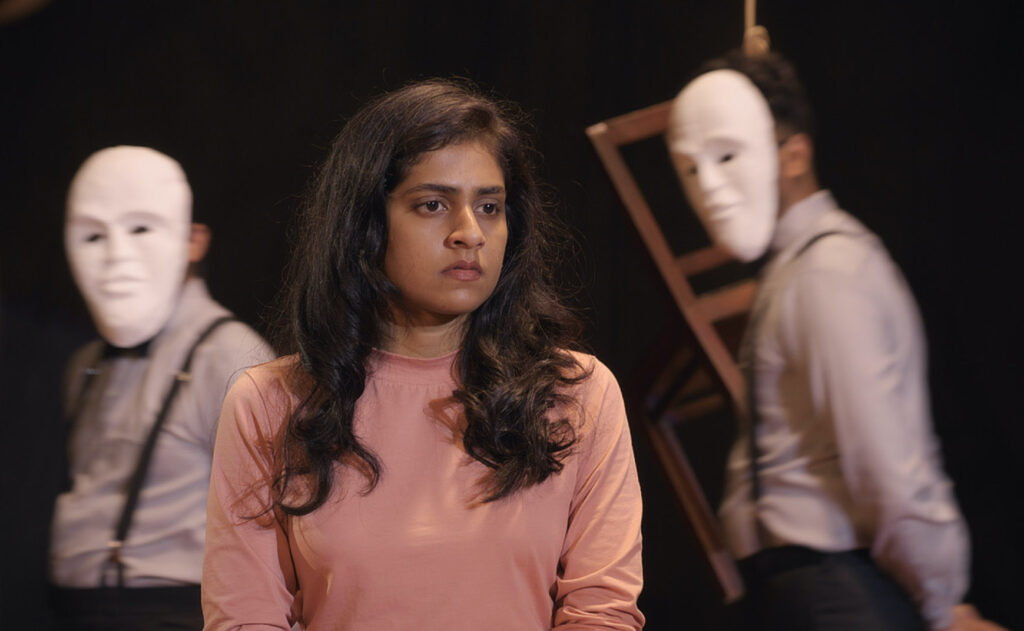After a successful run on the film festival circuit including winning the Grand Jury Prize for Best Film at the 2023 edition of the Indian Film Festival of Los Angeles (IFFLA) and following its theatrical release earlier this year, Anand Ekarshi’s Malayalam film, Aattam (The Play), is currently streaming on Prime Video. The film, following a sought-after regional theatre troupe, whose members find themselves in the midst of a scandal – their sole actress, Anjali, alleges that she was groped by one of the men on the night of their success party of their current play, is a nuanced and gripping piece of work that contains a myriad of layers, managing to maintain a sense of high intrigue right through the end.
It is very easy for a film like Aattam to conform to standard genre conventions in terms of both style and substance, with moody lighting, characters hurling over the top dialogues at each other and its key plot points being ever so predictable. Props to Ekarshi for doing anything but that – there is a certain unpredictability yet surprising plausibility to all that unfolds on screen. What comes across as an engaging whodunnit at its surface is actually a meditation on human conditioning, tendencies and impulses when they are faced with grave and unpleasant situations, accompanied with a set of moral ambiguities. And as in every well thought-out thriller, Aattam has the power to misdirect the viewer into believing that they’re one up on all that goes on, only to realise that Ekarshi has been two steps ahead all along.
There is also an additional responsibility that Ekarshi undertakes – to tackle and throw light on the prevalent subject of women facing sexual harassment at the workplace without reducing it to tokenism or a stereotypical, propaganda piece with symbolic heroes and villains. Thankfully, he gives the film a sensitive and pragmatic treatment to give us a rich, multi-layered piece of work. With his highly perceptive observations on gender equations in a state like Kerala, Ekarshi Aattam gives us as strong an indictment of patriarchy as any we might have seen on the Indian screen through Anjali’s final stand on the entire issue.
Anjali (Zarin Shihab), the only woman in the current production, has been with the group ever since she was sixteen years old. She shares the incident of her sexual assault with Vinay (Vinay Forrt), her long-time colleague-now-turned-lover. Unfortunately, Vinay’s support stems more from safeguarding his own honor and other personal agendas, as opposed to taking a course of action that Anjali is comfortable with. As Vinay reveals what happened to other members of the group barring the main suspect- the leading man, Hari (Kalabhavan Shajohn), who has been with them for two years and is now poised to make it big in films, the group indulge in a 12 Angry Men (1957)-esque high intensity series of discussions, deliberating on the best course of action – one that needs to be unanimous and yet retain the theatre company’s public image. It is through these interactions, that the mindset and personality of each troupe member and intra-group dynamics are effectively brought out: emotions and personal biases take precedence over objective thinking, with new alliances and sub-alliances being formed. Through them, Ekarshi also conveys his take on the duality of human nature – the troupe is ready to ‘ do the right thing’ and expel Hari from the group, until they find out he’s working on something that can bring the group great recognition and high financial reward.
Strong performances and taut writing prevent Aattam from ever lagging. The linear structure of the narrative piques the viewers curiosity and holds their attention as to see the events unfolding. Ekarshi’s deep understanding on human psychology gives him the freedom to create complex, believable characters and the clever choice of making his characters theatre artistes further augments his hypothesis on human complexity – one keeps guessing whether someone is being honest, or is merely putting on a front. The film’s cost-effective budget ensures that the cinematography remains practical, straying away from pretentious moody lighting and in-your-face, elaborate shot taking, thereby enhancing the film’s gritty quotient. The entire narrative flows at a nimble rhythm and smooth pace, not wasting a single cut on any sort of superfluous exposition. The highlight of the entire film however is its innovative use of sound design. Case in point when Vinay reveals to Anjali at the bus stop the exact reasoning for the group’s behaviour. Foley, incidental and ambient sounds become a character in and of themselves, acting as important hints and elements that drive the plot forward. The one drawback in the entire soundscape, as with practically all Indian films, is the occasional background score that honestly feels redundant, and is clearly used to fill up ’empty space’.
In the final analysis, it is greatly rejuvenating to see a suspense chamber film like Aattam that breaks away from conventional archetypes and protocols while ensuring non-trivial issues are tactfully and sensitively approached, thereby testifying to the fact that the suspense-mystery-thriller genre is far from reaching its saturation point.
Malayalam, Drama, Color


